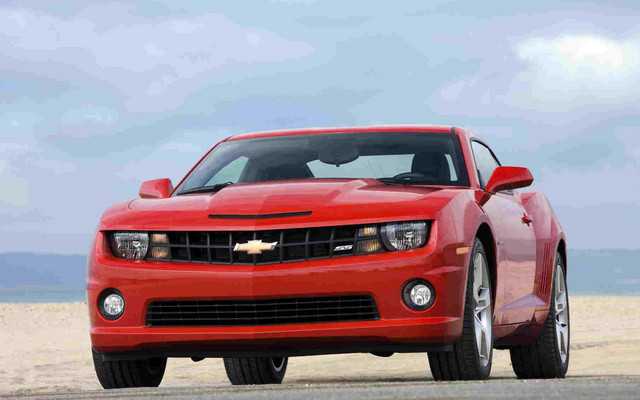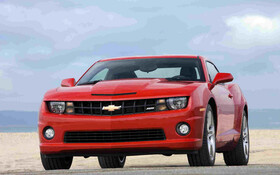2010 Chevrolet Camaro SS, an inspired beauty!

| Strong points |
|
|---|---|
| Weak points |
|
The Chevrolet Camaro is one of the most spectacular cars for sale this year. In fact, GM has just revamped this legendary model, adapting it to modern preferences. And contrary to what some people say, this vehicle was not brought back to save what used to be the world’s number-one car. The Camaro is back on the market due to popular demand after the presentation of a concept car at the Detroit Auto Show that highlighted the Camaro’s vintage appeal. The public was so enthused by this updated flash from the past that the decision makers at the Chevrolet division succumbed to the pressure and decided to develop this vehicle. For Chevrolet, this was also an opportunity to challenge the popular Ford Mustang and Dodge’s decision to bring back the Challenger. And yet, some naysayers claimed the vehicle would never see the light of day because of the manufacturer’s financial difficulties. But the Camaro was both developed and produced, despite the storm around it. This latest in a line of muscle cars was developed by Holden in Australia and is produced in Oshawa, Ontario, which means it’s not the same American beauty it once was!
In fact, some people were so astounded by the emergence of this coupe with spectacular lines that they had a hard time believing that the car I was driving was a production model. And when I informed them that it was manufactured in Canada, they were twice as amazed. As for my experience with it, I tried the V6 version last summer and in mid-October I was able to test the SS version which comes with a 6.1-litre V8 that produces 400 hp. No, there’s no mistake there. The version with the six-speed Tremec manual transmission produces 426 horses – it’s true. But since our test model was equipped with an automatic transmission, it produced a little less power.
October test drive
I’d put off testing the SS for weeks for several reasons, but I knew I wanted to try it before winter hit. And so, I finally booked it for a week in mid-October. When that time came, the car was ready for me, generating much envy among the clients at the Chevrolet dealership (which prepares cars for GM) as I slipped into the driver’s seat. From this position, I examined the dashboard and controls and concluded that the interior of this vehicle was quite similar to the inside of the V6 Camaro I had driven in the summer. It’s worth mentioning that the interiors of the V6 and V8 versions can be identical or different, depending on the options that you select. Several articles have mentioned that the controls positioned in the steering wheel can be difficult to use, but personally I had no problem with them. However, I can’t say the same for the gauges at the bottom of the vertical console. They were easy enough to read, but rather retro as they’re a throwback to the old Camaro. In fact, this car is a real flash from the past – even the modern silhouette is derived from the first Chevrolet muscle car from the 1960s.
Speaking of the Camaro’s silhouette, it’s a bit of good news and a bit of bad news. The good news is that the design is spectacular. Seriously, hats off to the stylists who did such a great job adapting the old model and giving it some ultra-modern lines while keeping the Camaro’s unique characteristics. If we compare this Chevrolet to the Ford Mustang or Dodge Challenger, this set of wheels is by far the most modern. Whether or not it’s the nicest of the bunch is a matter of personal taste. So, that’s the good news. The drawback of this design success is that the driver is the victim of some very narrow windows, a wide back end and some questionable visibility out front. All of this is made worse by the fact that the driving position is so low.
With the visibility so limited, I found myself backing up extremely cautiously so that I wouldn’t hit another car parked nearby. Luckily, the sideview mirrors are quite large. Nonetheless, you really feel like you’re sitting on the floor and visibility could be a whole lot better. If you suffer from claustrophobia, you’ve been warned!
Drive a few kilometers in the Camaro, however, and you’ll find you get used to this set up, which really wasn’t designed with visibility in mind. You develop an improved sense of what is around you, and you find yourself paying extra attention in traffic. You have to be careful not to graze the curb since the back of the vehicle is wider than the front. On a more positive note, I should mention the quality of the materials, and the fit and trim. I will admit that I had to concentrate somewhat on how to use the temperature controls, which can only be described as "original." If you’re worried about getting flustered by these, rest assured that you’ll have the system figured out within seconds.
Since the SS is a somewhat sporty vehicle, the front seats are comfortable while offering excellent lateral support. As for the back seats, they’re mediocre in terms of comfort and are generally better suited to nimble teenagers who aren’t too tall. The rear seatbacks fold down, which provides more space for baggage. That said, the trunk opening is relatively small (both the challenger and Mustang offer more trunk space).
Speed machine
All in all, you can quickly get used to driving the Camaro, despite the low driving positing and limited visibility. This vehicle is definitely more fun to drive on highways or windy country road because once you’re out of the city, you no longer have to keep checking the blind spots and can enjoy the car’s road handling and performance.
Now, there’s no point in buying the SS version just to impress others, as the V6 version with the right accessories will provide you with comfort and will do just as well at generating car envy with its head-turning physique. That said, opt for the SS version and you’ll find yourself at the wheel of real tiger with a 400-hp or a 426-hp engine that can take you from 0-100km/hr in 5.4 seconds and pass the quarter-mile mark in 13.5 seconds. At least, these are the figures Marc Lachapelle got from the manual-transmission version last July. Since it was pretty cold during our latest test drive with temperatures nearing freezing, the Pirelli P-Zero tires (which seemed pretty sweet in the summer) did not offer the same traction, making it impossible to test performances properly. But you can expect performance times to increase by 10-15% with the automatic version.
In fact, during the October test drive, it was not only very cold, it even snowed! This gave me the opportunity to discover the very effective stability control system and traction control. I must say, however, that they kicked in a little too soon. But it may be better to err on the side of prevention. In terms of performance, fans of powerful engines and that guttural sound you get from overhead V8 engines will be pleased. Yet, you still have to keep your wits about you and keep in mind that this is a heavy car and its engine offers generous torque at low rpm. And despite its rigid platform, large tires and great suspension, the laws of physics are the laws of physics. If you try to break them, you risk putting yourself in a compromising position.
But one thing is for sure, wherever the Camaro SS goes, it leaves an impression. And for many people, that’s more than enough.











